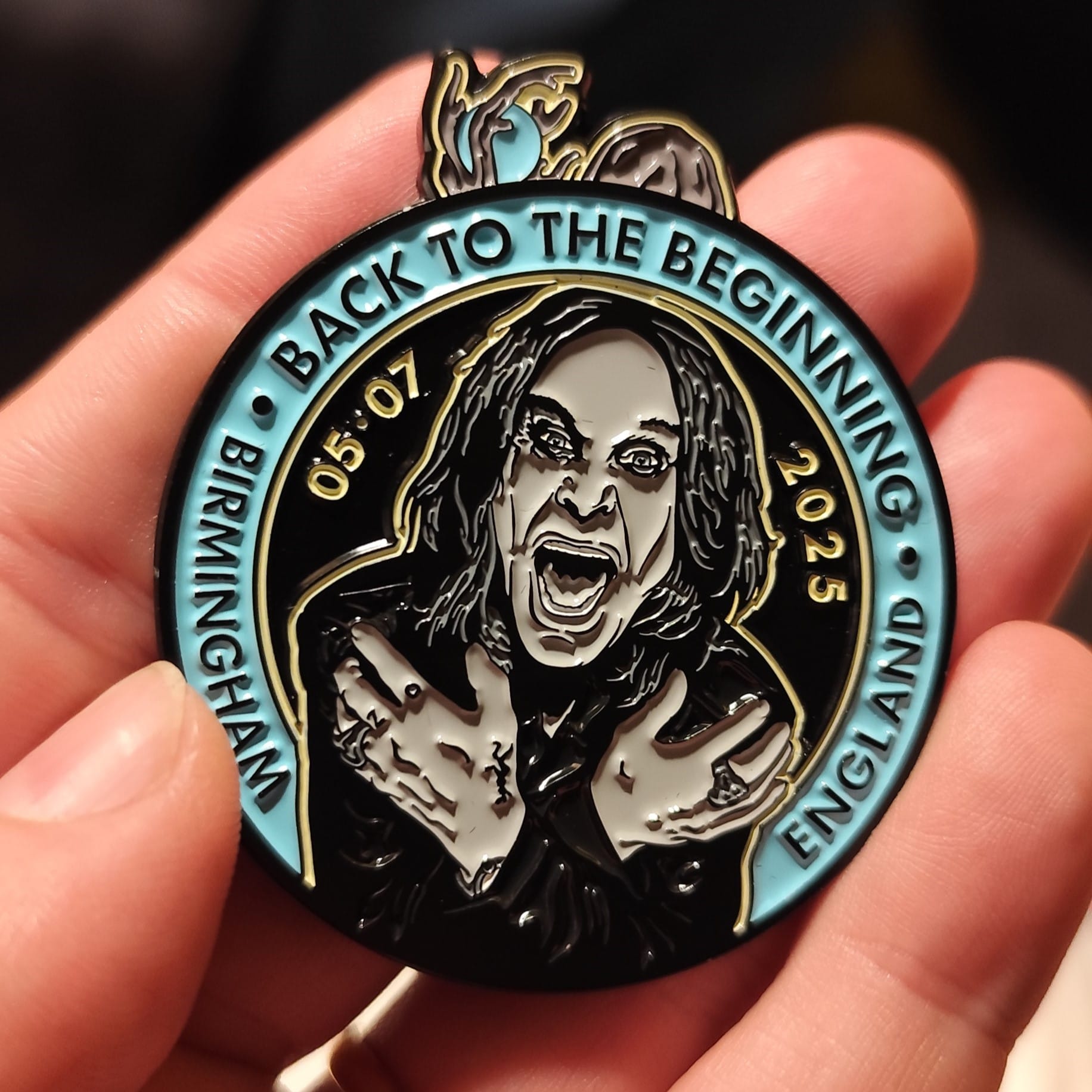It's not just the music. It's the memories, the friends, the stories. It's the kids, the neighborhood, the girlfriends, the streets, the nights, the dreams, the insomnia. It's the music woven into the fabric of life. It's a casual connection (more than causal) with indelible memories that shape you as a person. It's the habit of repetition. Of a riff, a solo, a bass line, a chorus, a mood, a memory, a part of life.
A sunny Saturday cleaning the house to the rhythm of "Crazy Train." The endless barbecue with friends and Masters of Reality in the background. The fifteenth joint of the night and "Planet Caravan" to take you on a cosmic trip. The train ride back with "I'm Going Insane." Or "Electric Funeral" on the bus bringing you home from work. "Changes" playing in the background while you stare at that message she sent to the B. An unexpected mosh pit with a Black Sabbath cover at your favorite band's concert. And so on to infinity. Every part of life, a part of a song. And all that because four guys decided to get together and play in a pub in Birmingham in the late '60s and name their band after an Italian movie starring Boris Karloff.
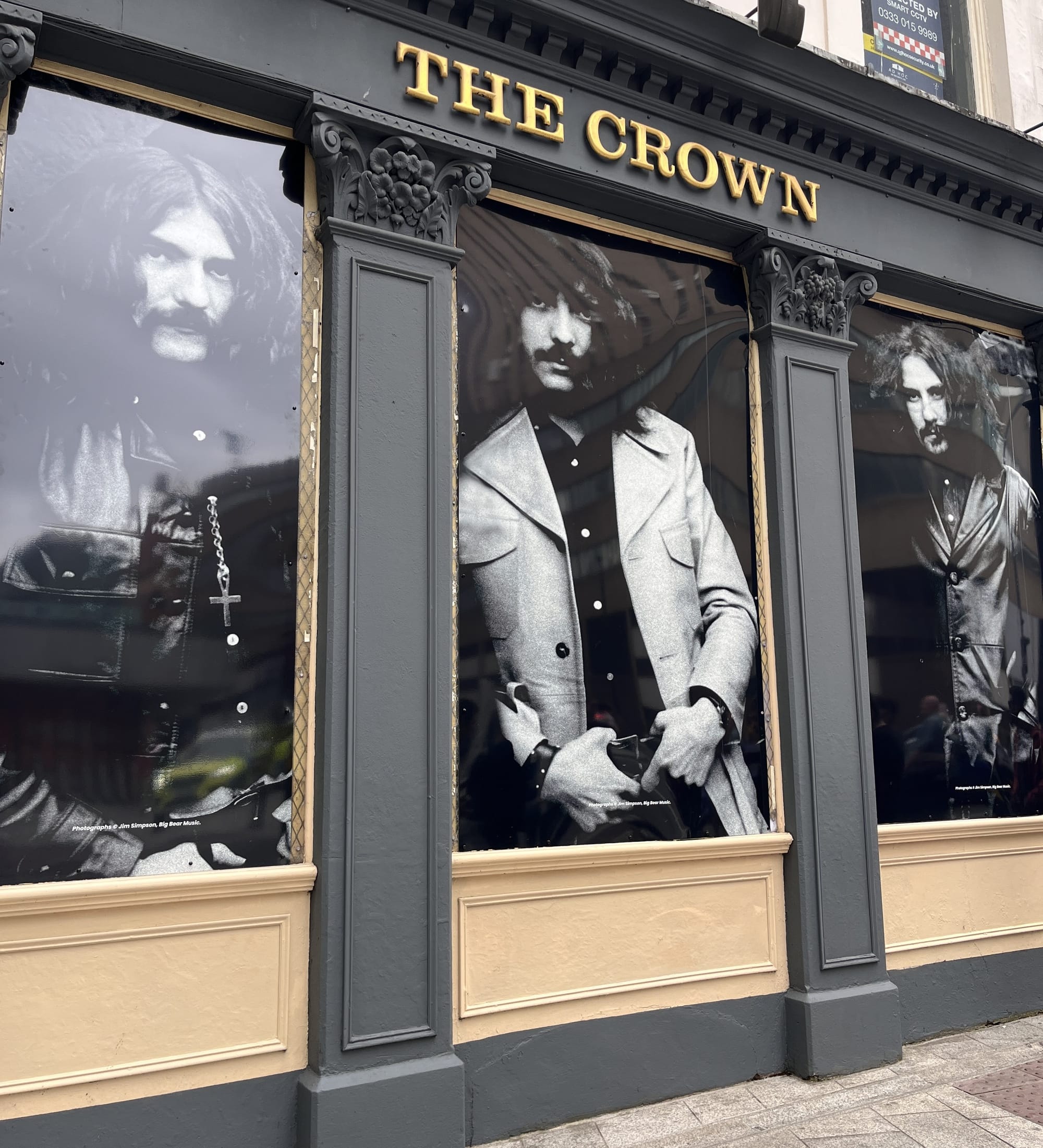
Back to the beginning
As if it were a universal rule, (almost) everything ends where it began. The return home. A classic trope in universal mythic literature: the odyssey. Not to mention the cycle of the Yugas in Hindu mythology; the destruction and reconstruction of the world in Norse lore. It's a neat closure, ontologically elegant. There, on the fine line between philosophy and self-help: life is an upward spiral. That's why that concept of "Back to the Beginning" framed Black Sabbath's farewell from the stage, simultaneous with Ozzy Osbourne's and his solo legacy. A concert built around the charismatic figure he built for himself, always on the fun side of life, but based on a musical trajectory reserved only for a chosen few.
Although rock is the musical genre I've dedicated the most time to in my entire life, I'm not entirely clear on when it started. I don't even know if it's possible to establish a concrete date or if it's a "process." Yes, in the end, it's always a process. The most common opinions are that it was in the United States with rock and roll, with Elvis as the archetype of the modern popular icon, or in England with the Beatles and the definitive triumph of the "rock band" concept (bass, guitar, drums, and vocals). Everyone must have their hypothesis.
On the other hand, with heavy metal, heavy metal or simply "metal," the consensus is almost unanimous: Black Sabbath. I say almost because there are also the heterodox who point to a hybrid origin shared with Deep Purple. In any case, it doesn't stray from there, but for me, there's almost no discussion: what Black Sabbath did is in another category.
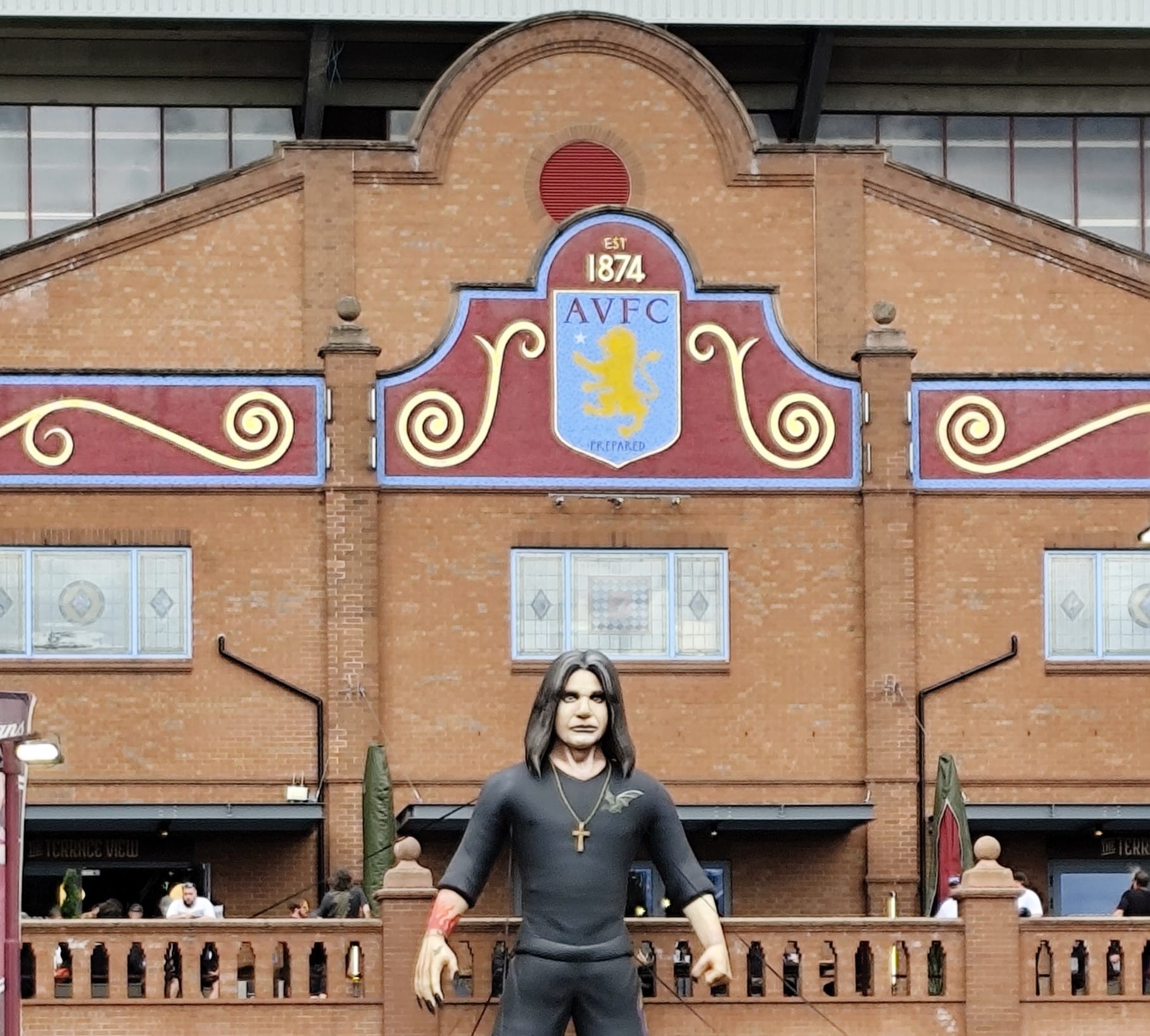
Their first four albums (Black Sabbath, Paranoid, Master of Reality, and Vol. 4) form a perfect tetralogy that contains, like the Big Bang or the Aleph, everything that would come after. A band that condensed an entire genre. A monumental work that, moreover, doesn't invalidate the rest of the group's history. The decade that the original lineup lasted was enough to leave a monumental legacy that would lead to the creation of a quasi-infinite universe. Metal Archives, the online encyclopedia dedicated to metal, has around 150,000 registered bands. Even Sabbath's albums with Ronnie James Dio are gems for anyone who dares to cross the threshold of Sabbatherian heterodoxy.
But the first four albums are like the four gospels. They're canonical. And by one of life's coincidences, because it could have been different, the four original members of the band were still alive to say goodbye in a big way. In an activity with as many deaths as rock, with so many fallen to drugs, accidents, or suicides, it's almost a miracle.
Technically, Black Sabbath had already had their comeback, the retirement tour to ensure a good life for their children and grandchildren. Maybe even for another generation. But that surprising return was somewhat truncated by the absence of Bill Ward. A 75% Black Sabbath was still a lot, and all the fans responded with total loyalty. However, there was that thorn of seeing the lineup at 100%. And finally, it happened for the last time.
The chosen venue was the Aston Villa stadium, an iconic club of the city of Birmingham, on whose streets the Sabbaths were born and raised. The same city that housed the factories where Tony Iommi, as a metalworker, sliced off his fingers and was forced to recalibrate his way of playing the guitar. He had no better idea than to tune the guitar a tone lower to make the strings looser, and the rest is history. Another stroke of luck in the history of the best rock band of all time (sorry, Led Zeppelin).
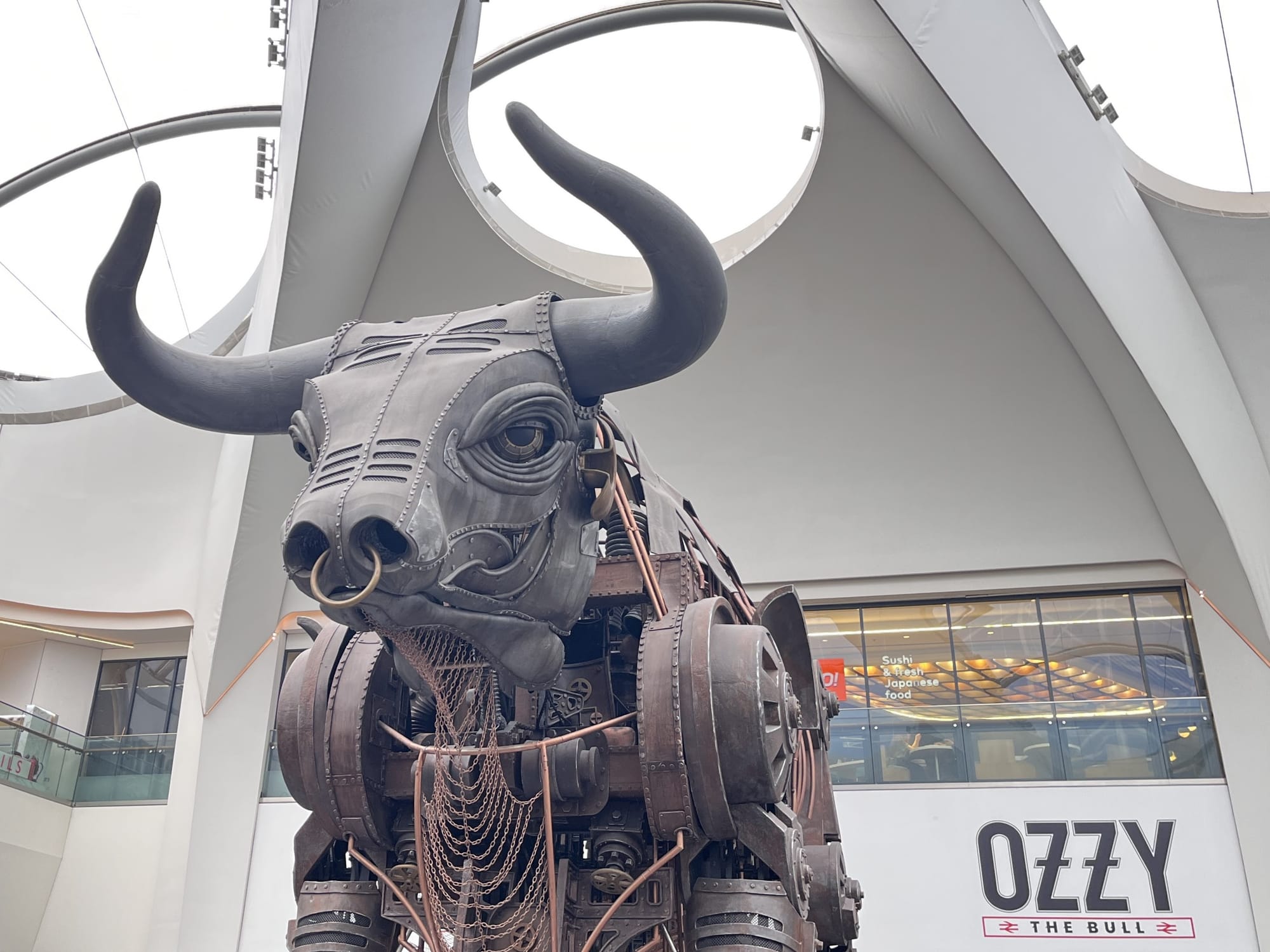
Birmingham, the craddle of Black Sabbath
As soon as you get off the modern Birmingham train station, you already recognize some aspects of the city. A giant bull in the central hall, named Ozzy. Upon stepping out onto the street, you understand the substantial difference between this city and London. Birmingham is a battered city, pretty but a bit messed up. The first thing you find is the facade of The Crown pub, ground zero of metal, closed but rescued by the fans.
Black Sabbath is a prophet in its own land. They have their own bridge (Sabbath Bridge) in the middle of an area full of little bars for going out partying. Every important place in the city has a reference to the band. This Saturday, July 5, the city was flooded with fat guys dressed in black, vests and caps of all kinds, beards, long hair, boots, all united in a final pilgrimage. They were the silver crosses of Black Sabbath.
On the way to the stadium, you could see social housing, built very neatly, houses that in Argentina would be almost a luxury, but with front yards full of trash. Everything dirty and disorganized. Lots of markets full of fruit and vegetable stands with a large majority of Arab customers. New infrastructure works, in full construction, coexist with old train stations that remind you of the San Martín line. The wooden roofs are the same. Here too, that industrial revolution infrastructure lasted more than a century. A picturesque but gray city. I imagine a cloudy Sunday at seven in the evening in Birmingham and I perfectly understand that dense atmosphere of the self-titled debut album, Black Sabbath.
The controversy on social media
When the concert was announced, all the corresponding propagation and confusion mechanisms were triggered. Ironically, the largest accounts for spreading and reaching heavy metal are on Instagram. Not Twitter, not TikTok, nothing: Instagram. I figure it has to do with the bulk of fans having accounts on that network—which spiritually replaced Facebook and, therefore, the digital common sense of the +30 generation. I say ironically because it's at least funny that the network where image, vanity, and fakery are the norm is the one that "metal" uses to communicate. Life's quirks.
The digital reactions to the news covered the entire possible spectrum. From total euphoria to total indignation. Ah, yes, the era of instrumentalizing emotional reactions to generate interaction. In the end, the classics: "It's going to be the best show in history," "Ozzy robbing again with another farewell," "These old guys just want money." Blah blah blah.
As the date approached and bands kept being added to the concert, the hype kept growing. On the day of the sale, everything sold out in instants. This humble servant got tickets thanks to the fine work of his lady (whom you can read here and/or follow here), who found a glitch in the matrix. Aston Villa members could access an early presale. And it turns out you could join the club without paying anything, just by filling out the web forms. We joined, waited for the date, and when the first presale came out, we were 22nd in the virtual line. The madman at the lottery and the name of the Wolf's band. Ah, yes, and the farewell was at Villa Park, which we could translate as villa park, or Villa del Parque if we force the wordplay a bit. Another treat for this humble servant.
The anticipation for the show became immense as bands were added, younger than Black Sabbath but no longer young in absolute terms. Artists who marked all our lives. Assembled lineups, decimated, with soldiers fallen along the way, and more than one breakup and reconciliation on their backs. Total tanks. Tool, Pantera, Metallica, Guns N' Roses, Slayer, Alice in Chains, and a cascade of surprise guests. One heavyweight after another. One legacy after another. The unknown was how such a quantity of artists would fit into a single day. The proceeds, moreover, would go to the Birmingham hospital to fight Parkinson's. As this note is published, the total amount raised and donated exceeds 140 million pounds sterling. The refuters were already wanting to screw their dicks to the floor.
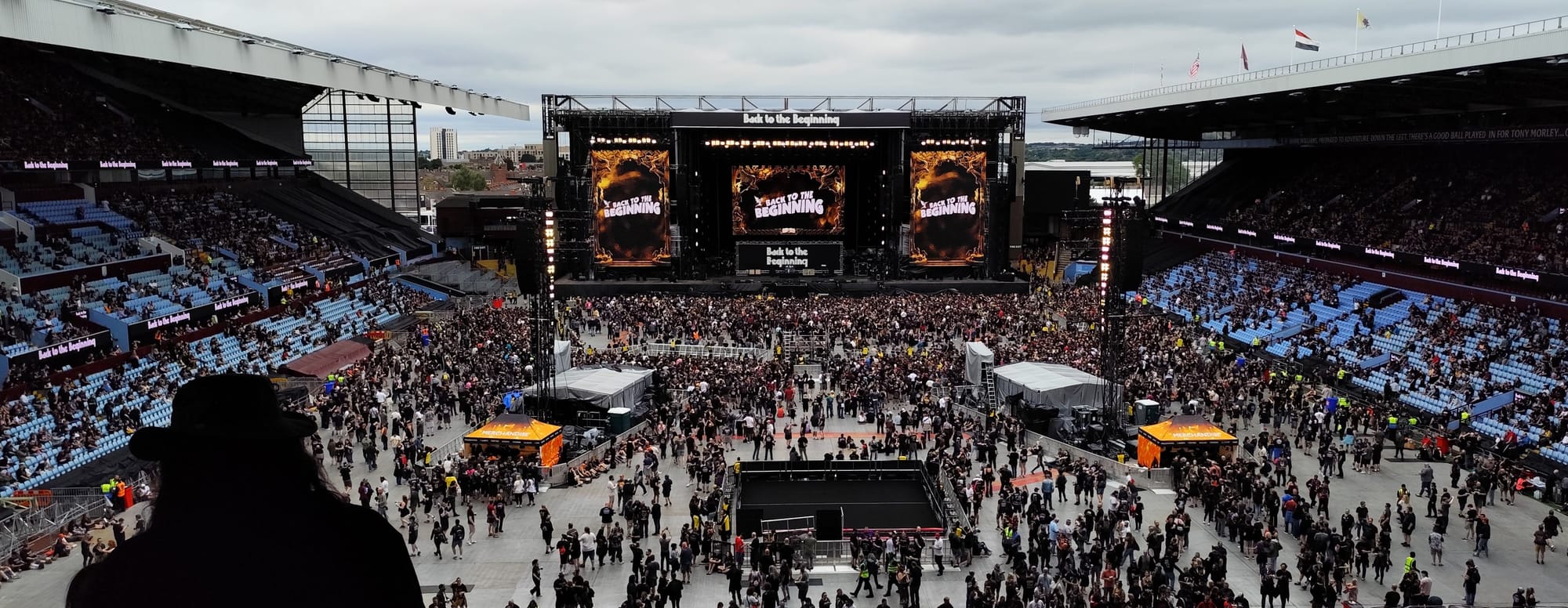
The state of the art
As the date approached and details came to light, both those involved and fans realized that this would be historic like nothing before. On one hand, the farewell of the band that started it all. On the other, a review of the greatest in the genre and a kind of "state of the question." Knowing where metal is today and where it's headed.
The question hangs in the air: what will happen when Ozzy is no longer around? Because between one thing and another, the old man was always there. Even though he threatened to bow out more than once, he always stuck it out. He's the godfather and guardian of a genre with a very long, fruitful history, and one that today faces the reality of not being even remotely one of the most popular.
Although it counts among its ranks worldwide number ones like Metallica, capable of carrying the weight on its shoulders, and has later exponents with no lesser reach (Gojira was the first band in the genre's history to play at an Olympic Games), it's true that at classic metal band concerts, you hardly see teenagers or kids under 25. We're a human group that grew up and aged alongside our idols. But from the 2000s onward, we've been fighting in our trench against a scene captured by other more popular styles. This doesn't mean there aren't incredible bands, new faces, or anything like that. Simply that before, you'd turn on MTV and hear Pantera or Metallica. And at the beginning of the century, Limp Bizkit, System of a Down, or Linkin Park. But Significant Other is already 25 years old, and today there are no metal bands or artists in the top worldwide charts.
Rock was made for the live show
The concert/festival started strong and right in the middle: Mastodon. The stadium exploded with "Blood and Thunder" and "Supernaut." Musical direction was handled by Tom Morello, who assembled the widest and toughest selection of musicians of all time. While we all knew it was going to be insane, witnessing it live is another thing. Rock was made for the live show.
Albums, recordings, are a way to immortalize that music, but what happens on stage when there's a drum kit, a bass, a guitar sounding loud, fast, and with distortion (or at least two of those), there's nothing like it. And it's that ritual that keeps us all alive. What keeps the "genre" alive. Live music is irreplaceable. The energy of a good metal band live is irreplaceable. And even if it's not among the most popular, it has the necessary foundations to survive the passage of time.
Next came a series of new and sponsored bands trying to fill the generational gap but far off in musical terms: Halestorm and Rival Sons. All good, no drama. They also played "Electric Funeral" and "Perry Mason." Good time to grab food and booze. Ah yes, concerts here are still mass entertainment events with all that implies: more VIP sections than others, food stands very close to the seats, beer allowed in the stands during the show. And so on. Like the Movistar Arena in Buenos Aires but on steroids.
Then came Anthrax, who delivered, and Lamb of God, who pulled off a tremendous cover of "Children of the Grave" (the only time it would sound all day). And then the first surprise: supergroup A, who played "The Ultimate Sin" and "Shot in the Dark" (beautiful duo), "Sweet Leaf," "Believer," and "Changes." The latter performed by Yungblud, who killed it with an impressive vocal range. After all that came a projection of Jack Black playing "Mr. Crowley" surrounded by kids like in School of Rock, including the sons of Scott Ian and Tom Morello. Chill.
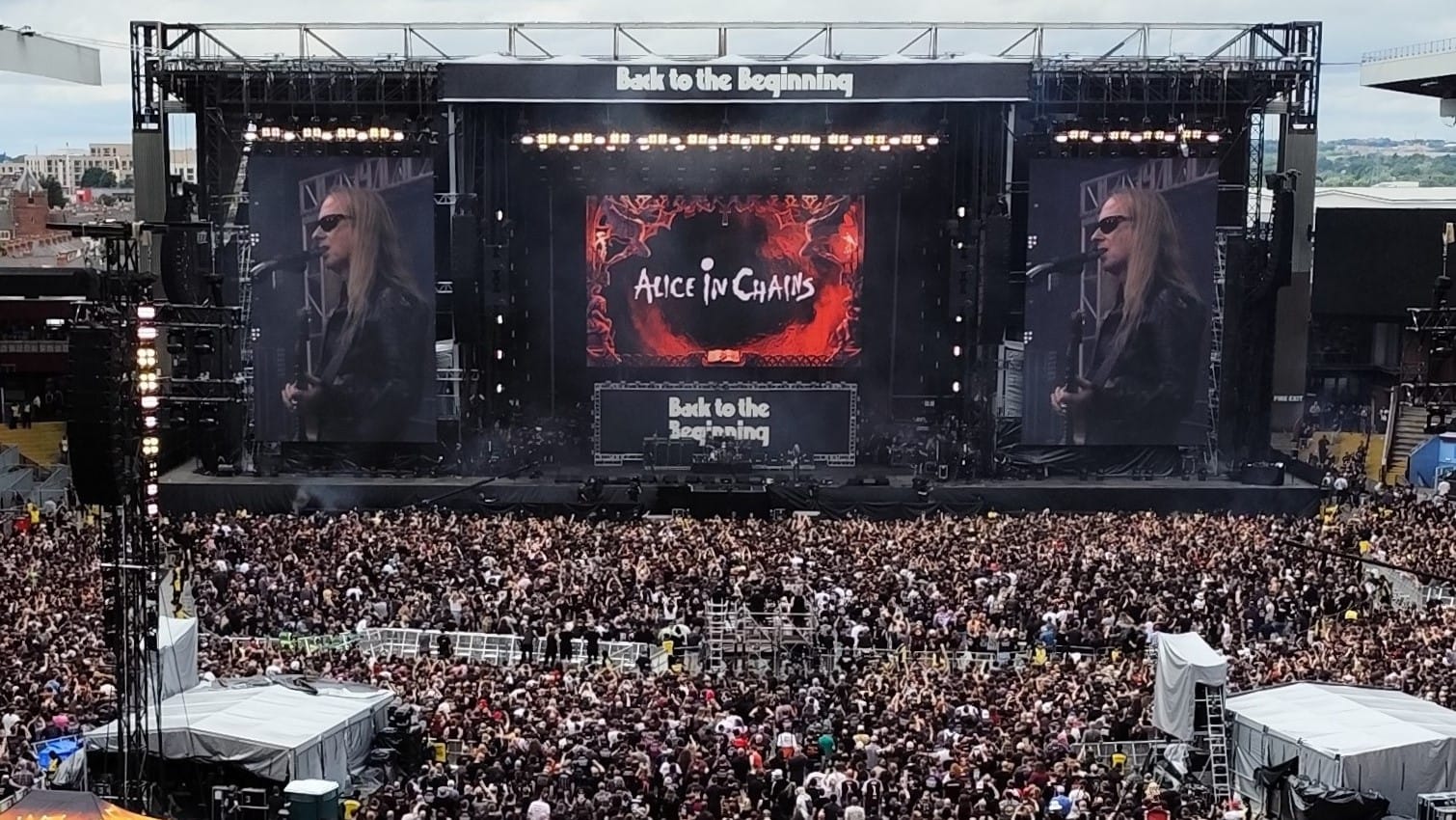
And then the first bombshell: Alice in Chains. Seeing the beautiful Jerry Cantrell playing the riffs of "Man in the Box" is a perpetual injection of life. First time hearing William DuVall fronting the band, and I must say he's very tight, a great singer. But Layne's hole is impossible to fill, and his absence is one of the big ones of the night. It wouldn't be the last: as we already said, every band went through its own loss. Then came "Would" and they closed with "Fairies Wear Boots."
Alice in Chains gave way to Gojira, perhaps the most international metal band of the moment or with the greatest projection. They put on a correct show although they sounded a bit lower than usual—I had the same experience when I saw them at the Movistar Arena, unlike the steamroller they were at Luna Park—but they still gave a tremendous concert with the Du Plantier duo on fire, as usual.
Then came the second supergroup moment. It started with a three-drummer duel between Travis Barker, Chad Smith, and Danny Carey, backed by Tom Morello, Nuno Bettencourt, and Rudy Sarzo. A beast. And then came the super strong dish of supergroup B with vocals by Billy Corgan, who did "Snowblind" and "Breaking the Law." The band change followed with Sammy Haggard on vocals and closed in a summit of killer rock with Steven Tyler and the one and only Ron Wood from the Rolling Stones. Insane madness.
After the supergroup, we entered the home stretch. Pantera opened, with Zakk Wylde on guitar, and there emotion took me over. Phil Anselmo asked for a strong salute to Dimebag, and at the first chord of "Cowboys from Hell," four or five mosh pits appeared in seconds. It continued with "Walk," which the whole stadium sang at the top of their lungs, and, as it couldn't be otherwise, the cover of "Planet Caravan." There my heart couldn't take it anymore, and I cried my eyes out. Pantera is the foundational band of my friends from Villa del Parque. It marked us from childhood, in the '90s, and became our identity in the 2000s.
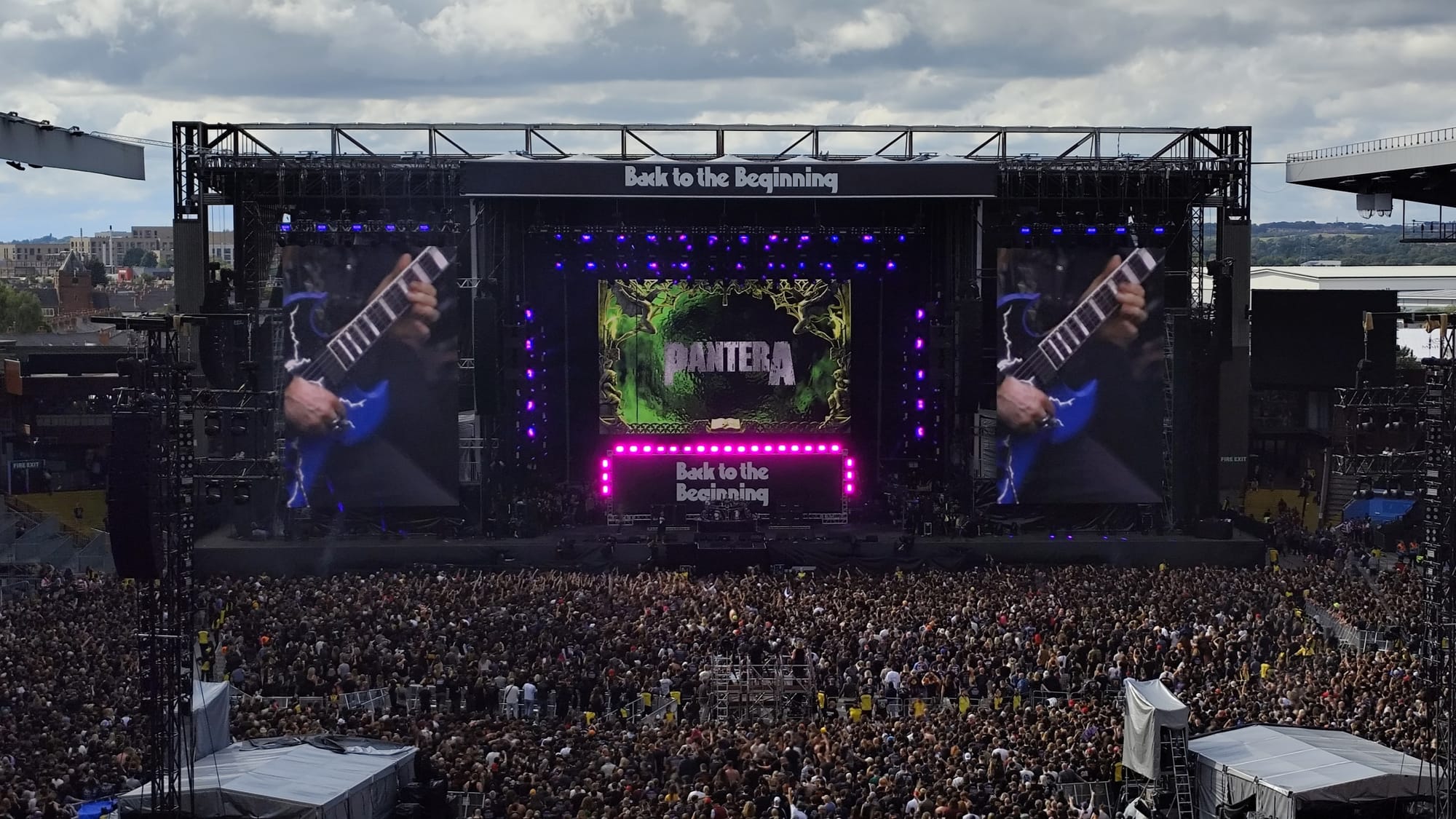
We never really recovered from not being able to see them because we weren't old enough when they came, but fueled by the Vulgar Videos, we had the most beautiful adolescence and youth we could have had. Partying, beer in quantity, music, rehearsals, bands, destruction in quantity. Some of that was captured in 3220, my little novel that flew under the radar. Barefoot, Phil Anselmo sang "Electric Funeral," and the sadness of never having seen Vinnie Paul or Dimebag live eased a bit.
It was Tool's turn, who sounded beastly as always. Maynard honored his place in the world as the weirdest of the weird and played wearing a t-shirt that said "not local." They played "Forty Six & 2," "Hand of Doom," and "Ænema." Obviously, the cover was in the middle because the symmetry vibe doesn't go away with anything. Then it was Slayer's turn, perhaps the heaviest band of the date, who opened like a steamroller with "Disciple" and closed with "Angel of Death" to remind us that it's not really a band but a war machine that turns on at the first chord and only turns off when you're dead and thrown in a ditch.
That's how Guns N' Roses arrived, who dished out three covers right off the bat, one of them "Junior's Eyes," which I sang at the top of my lungs like a madman. The people around were cracking up and encouraging me since I was the only one—at least in the stand I was in, the one at the back—who sang it as if it were, I don't know, "Paranoid." They completed the triad with "Never Say Die" and "Sabbath Bloody Sabbath." Plus their classics "Welcome to the Jungle" and "Paradise City." Slash deployed all his magic, which was anticipated as soon as two notes sounded, and Axl was a bit off-time in one song. Beyond that, I saw Guns N' Roses live, what more can I ask?
And as the last dish of the guest bands, none other than Metallica. Who dished out six songs, sounded beastly, tighter than the last time I saw them, and reminded us why they're the biggest active metal band of all. Perfect sound, perfect concert. In this order, they did "Hole in the Sky," "Creeping Death," "For Whom the Bell Tolls," "Johnny Blade," "Battery," and "Master of Puppets." They say good and brief is twice as good; I say a six-song show like that and add "Seek & Destroy" to fulfill the ritual, and it's almost perfect.
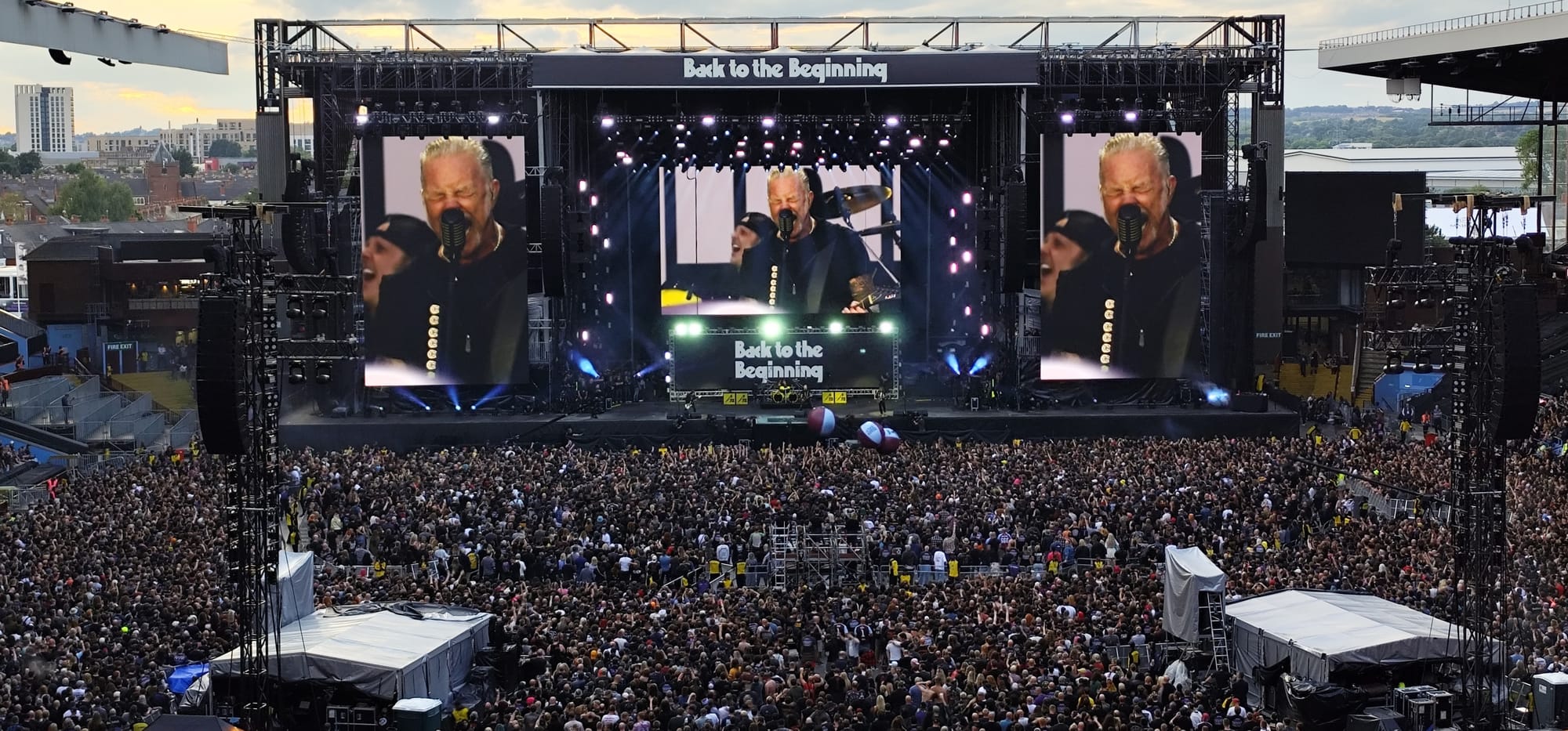
With no more bands waiting to play except the honorees, some of the unknowns about the current state of metal had been answered. Despite the passage of time and the fact that the vast majority of those present are all gray-haired gentlemen—I'm already in that process—the bands sound tremendous, at least live, with the volume cranked and the stadium mix. Maybe on the broadcast, with channels equalized differently, the feeling could be different. What is clear is that those who suffer the most from the passage of time are the singers, who have to face the logical deterioration of their instrument, the voice.
It's also clear that the peak moment of each band is part of the past. Black Sabbath composed their repertoire in ten years between 1968 and 1978, James Hetfield composed "Master of Puppets" in his twenties, Dimebag Darrell has been dead since 2004, Layne Staley is a legend that grows every time the earth completes an orbit around the sun. Many of the most influential musicians in this genre appeared in the metal firmament and died before Black Sabbath retired.
The passage of time and the effect of entropy on our favorite bands, on the genre itself, and on us is undeniable. But it was demonstrated that this is not an impediment for the musicians who composed these hymns to continue performing them throughout their lives, as long as they feel the need or are comfortable doing so. You can't turn back time. What was, is gone and will never return. But while we're alive, let's keep enjoying the present, what we are, and what brought us here. As the meme says: "Tradition is not the worship of ashes, but the preservation of the fire."
Let the band come out, we want rock
And then it was the moment we were all waiting for. Seeing how Ozzy was. In the middle of a dark stage, the Prince of Darkness emerged, seated on a black throne. Visibly affected by Parkinson's, but with his spirit intact. Accompanied by his friend Zakk Wylde, with whom I had the honor of seeing him at Quilmes Rock in 2008 in a concert that changed my life forever. The chords of "I Don't Know" sounded, and with that, Ozzy's voice, as best he could, came out of the icon's throat and made the stadium delirious.
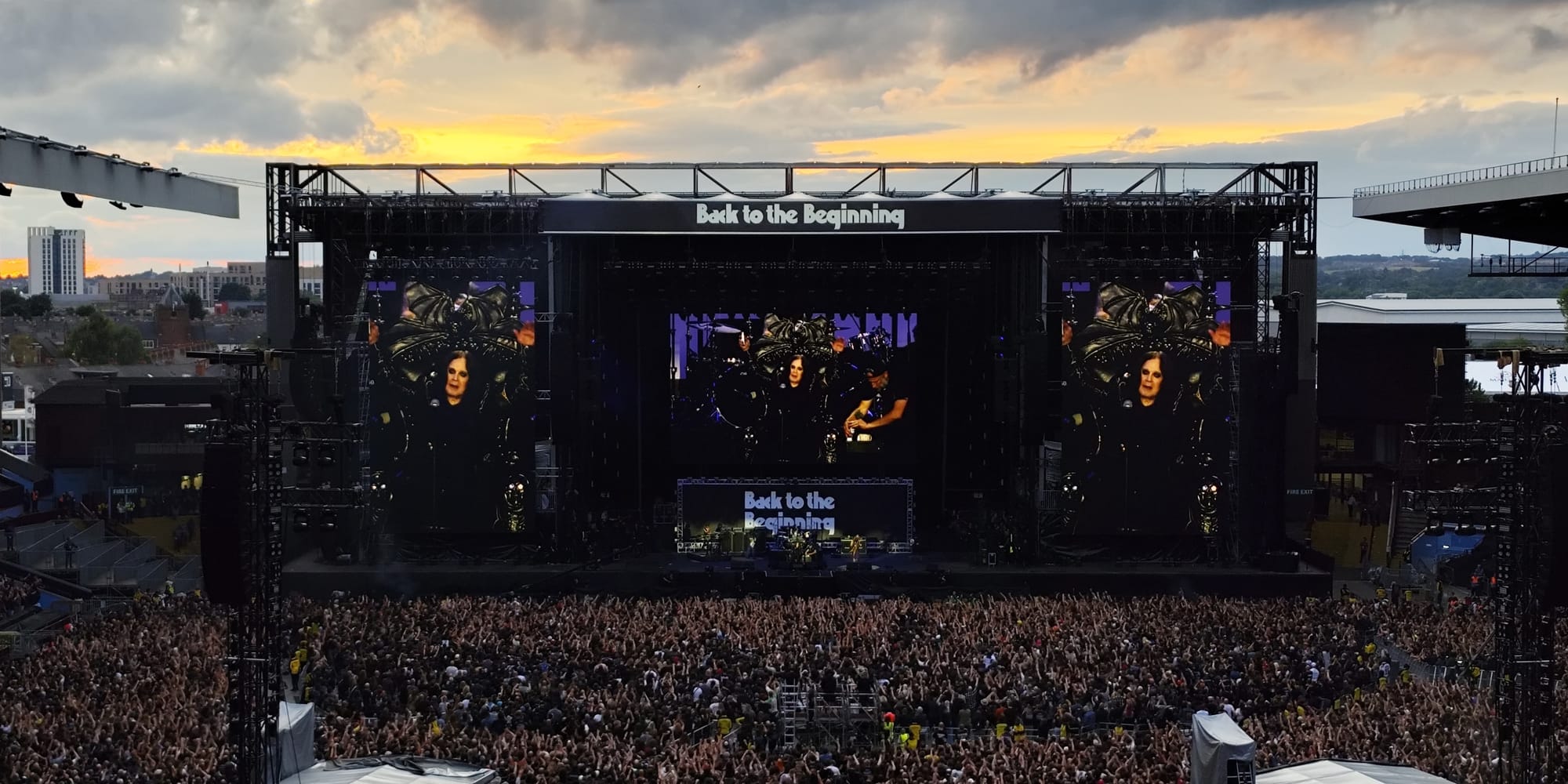
Followed by "Mr. Crowley," "Suicide Solution," and "Mama, I'm Coming Home" with visible emotion from the champion of the kids, who put us all on a tough emotional train. Trying to stand from the seat, waving his arms, making the characteristic faces, and asking us to break everything. The remembrance of Randy Rhoads, another fallen in battle, and the close with "Crazy Train," when I could no longer contain the emotion and cried my eyes out, in memory of friends, those who are here, those who aren't, those who stay by your side, those who got angry over some stupidity. In short, all of life. With Ozzy visibly exhausted from the tremendous effort it took him to sing, came the final recess and the wait for the last show of the day. What we all came to see.
And after waiting a while, during which we all thought about how Ozzy was going to continue, the alarms sounded, the screens showed war scenes, and the chords of "War Pigs" rang out. And there, as if we were in 1968, in The Crown pub, these four guys, each with their instrument, executed the classic notes of the still-relevant anti-war hymn. Geezer Butler, Bill Ward, Tony Iommi, and Ozzy Osbourne met for the last time on a stage to say goodbye before 50,000 people, in their hometown, in their football team's stadium, and for nearly six million people watching them online.
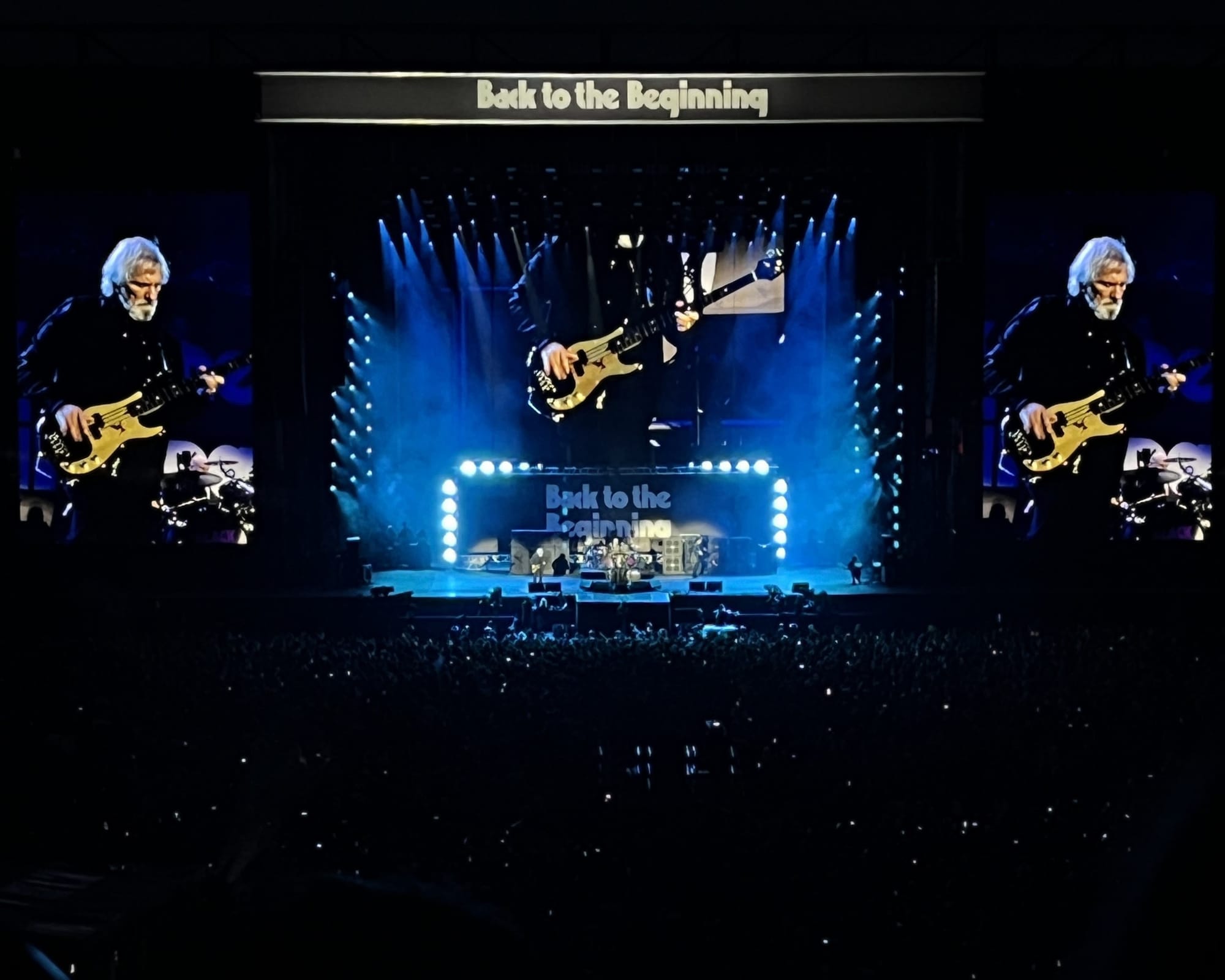
Because they deserved a farewell worthy of their history. Because the greatest of this genre and of rock as a whole were present (Steven Tyler with Ron Wood!), because they sent greetings from Elton John to Judas Priest, passing through AC/DC and Dolly Parton, because they showed that despite the passage of time and even Ozzy's illness, they're more alive than us. And then "N.I.B." sounded, and it was impossible not to go back to the album that started it all.
And "Iron Man" sounded, and I couldn't help but think that it was the first song I ever heard from them (at 15, playing a text game called Drug Lord) and I couldn't help but think of Nacho and Román, the only two metalheads in the whole school who in 2001 were already wearing Cannibal Corpse t-shirts and Napalm Death patches and initiated me into extreme metal. Impossible not to think of Guido, Emi, el Negro, Pope, and el Cabezón, the crew with whom I went to a thousand concerts, saw a thousand bands, and lived a thousand things, always with music as the link. "And what the hell do I care about your friends?" you might be thinking, but I'm almost sure that anyone reading this has their own version of them. Those iron friends, unshakeable, those friends with whom Sabbath and metal fused forever. "To you, friend," as Ricardo used to say.
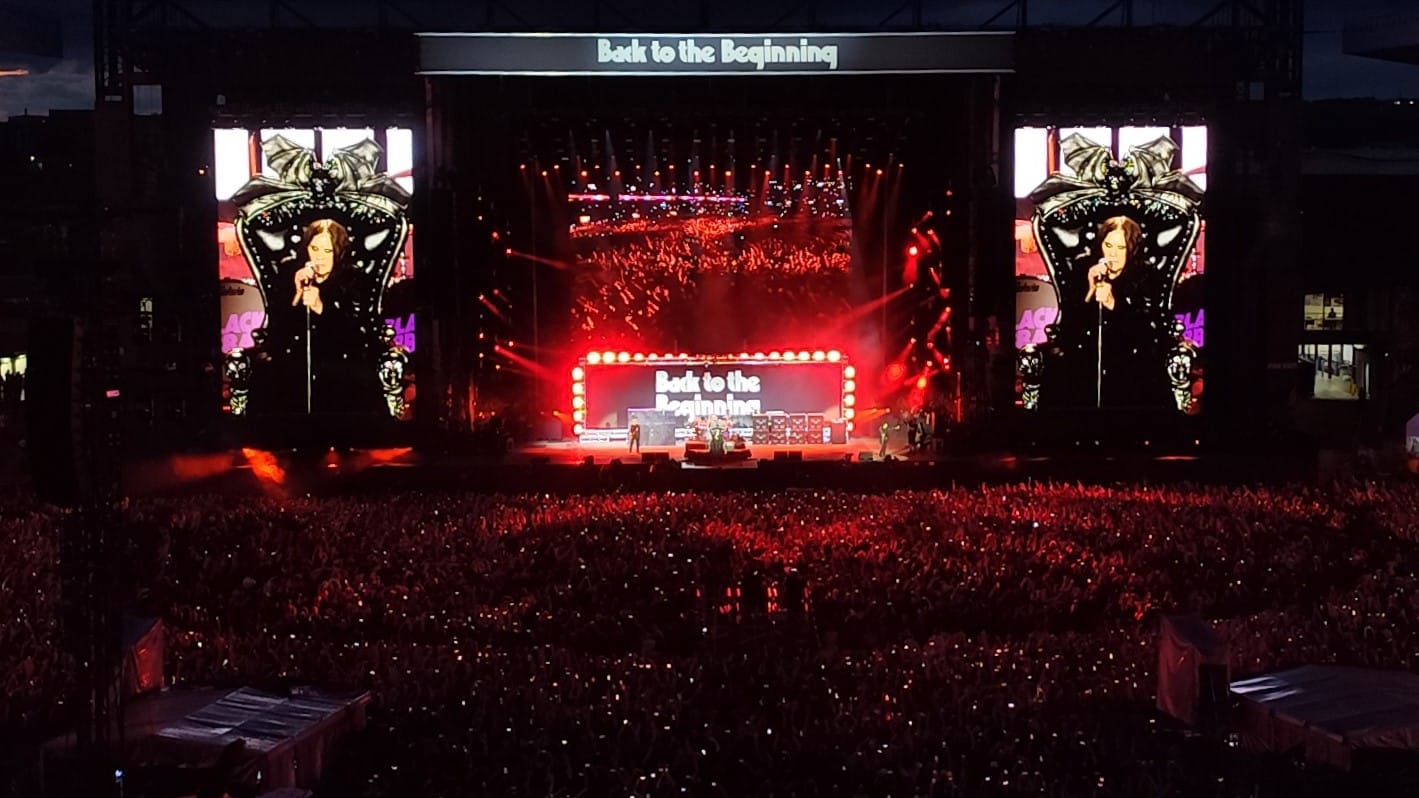
And with no more bands waiting or songs in the chamber, "Paranoid" sounded. The hymn that made Black Sabbath a planetary cultural icon beyond the genre, beyond England, beyond rock. And in those last notes, that riff and that solo we all know by heart, we saw the timeless spells of these four modern wizards who made the world a much better place than they found it. And the last note sounded, the lights went out, and they said goodbye. Worthy of the history they forged, before the privileged eyes of those who could be there. Before the screens of millions of people around the world who deserved to be here just as much as everyone.
Y con esas luces apagadas se terminó la historia de Black Sabbath en el planeta Tierra. La historia de los músicos que nos hicieron inmensamente felices, que se metieron en nuestra vida y nos dieron sentido a cambio de nada. Un último acto de generosidad conmovedora. Una última despedida para saber cuánto los amamos y cuánto nos amaron. Y mientras las luces se terminan de apagar y una ronda de fuegos artificiales trona en el cielo, de la mano del amor de mi vida busco la salida rápido para llegar antes al micro que nos lleva al hotel y descansar un poco después de esta aplanadora emocional, sólo puedo pensar en que el arte es lo más grande que tenemos.
That, and the well-deserved rest awaiting these The user asked to translate this text to English. The text is in Spanish and appears to be an article or essay about Black Sabbath, their history, influence on metal, and a fictional or hypothetical final concert in 2025.
